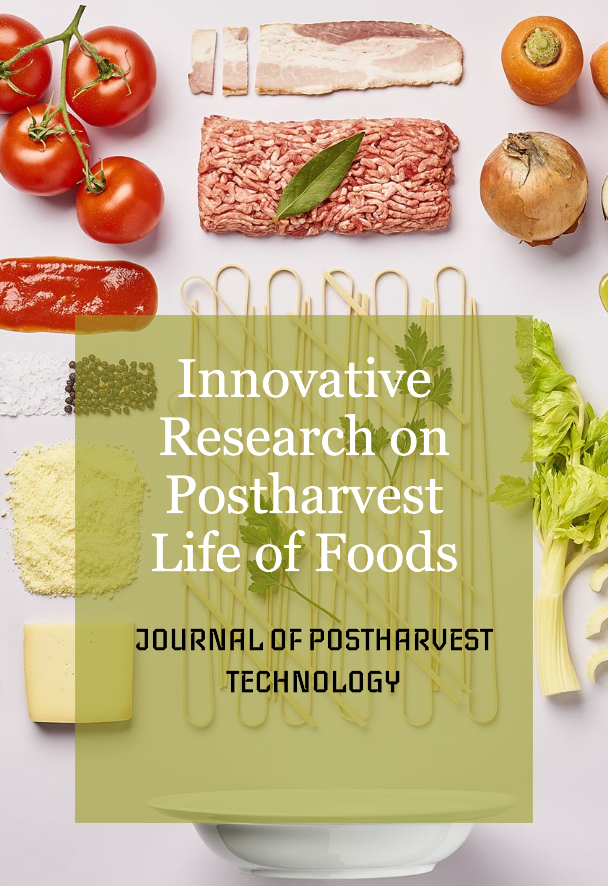The Effects of a Low Cost Hydro Cooling System on the Postharvest Quality Characteristics of Selected Tropical Fruits and Vegetables
Keywords:
Cooling time, Hydrocooling, Low temperature storage Postharvest QualityAbstract
Quality of fresh produce getting to consumers is influenced by the postharvest handling practices. In developing countries, low cost hydrocooling system offers affordable means to curb postharvest loses of perishables. This study was undertaken to establish the effect of combining hydrocooling and low temperature storage on postharvest quality of perishables, specifically carrots, courgettes, tomatoes and African eggplants. Mature good quality produce were harvested and divided into four portions. Two portions were hydrocooled using chilled water (2±10C) and change in temperature monitored. The other two were controls. Hydrocooled and control samples were stored at 100C and 20- 250C at 95%relative humidity. Respiration rates, weight loss, soluble solids and titratable acidity changes were assessed at 2 days interval for 9 days. The percentage weight loss on day 9 was 1.83 %, 13.91 %, 8.09 %, 6.25 % and titratable acidity was 0.24%, 0.019%, 0.13%, in samples hydrocooled and stored at 10 0compared to 4.30%, 28.35%, 20.03%, 2.15%weight loss and 0.32%, 0.037%, 0.16%,titratable acidity in control for tomatoes, courgettes carrots and African eggplants, respectively. Respiration rates and soluble solids were higher in controls. Storage time had a significant effect (P≤0.05) on produce quality.
References
Carvajal F, Martinez C, Jamilena M, Garrido D (2011) Differential response of zucchini varieties to low storage temperature. Sci Hortic (Amsterdam) 130:90–96. doi: 10.1016/j.scienta.2011.06.016
Concello´n A, An˜ o´ n MC, Chaves AR (2007) Effect of low temperature storage on physical and physiological characteristics of eggplant fruit (Solanum melongena L .). Swiss Soc Food Sci Technol 40:389– 396. doi: 10.1016/j.lwt.2006.02.004
FAO (2014) Food Loss Assessments: Causes and Solutions. Rome
Hailu S, Seyoum T, Dechassa N (2008) Effect of combined application of organic P and inorganic N fertilizers on post harvest quality of carrot. African J Biotechnol 7:2187–2196.
Hounsome N, Hounsome B, Tomos D, Edwards Jones G (2008) Plant metabolites and
nutritional quality of vegetables. J Food
Sci 73:48–65. doi: 10.1111/j.1750-
2008.00716.x
KARI (2012) Report on National Vegetable Stakeholder APVC Priority Setting.
Khanal B, Uprety D (2014) Effects of Storage Temperature on Post-harvest of Potato. Int
J Res 1:903–909.
Khorshidi J, Tabatabaei MF, Ahmadi FM (2010) Storage Temperature Effects on the
Postharvest Quality of Apple. New York
Sci J 3:3–6.
Kitinoja L (2010) Identification of Appropriate Postharvest Technologies for Improving
Market Access and Incomes for Small
Horticultural Farmers in Sub-Saharan
Africa and South Asia.
Kitinoja L, Saran S, Roy SK, Kader A a. (2011) Postharvest technology for developing
countries: Challenges and opportunities in
research, outreach and advocacy. J Sci
Food Agric 91:597–603. doi:
1002/jsfa.4295
Luengwilai K, Beckles DM (2013) Effect of low temperature storage on fruit physiology
and carbohydrate accumulation in tomato
ripening-inhibited mutants. J Stored Prod
Postharvest Res 4:35–43. doi:
5897/JSPPR10.012
Makwana SA, Polara ND, Viradia RR (2014) Effect of Pre-Cooling on Post Harvest Life of
Mango. Food Sci Technol 2:6–13. doi:
13189/fst.2014.020102
Manganaris GA, Ilias IF, Vasilakakis M, Mignani I (2007) The effect of hydrocooling on ripening related quality attributes and cell wall physicochemical properties of sweet cherry fruit (Prunus avium L.). Int J Refrig 30:1386–1392. doi: 10.1016/j.ijrefrig.2007.04.001
Reina LD, Fleming HP, Humphries EG (1995) Microbiological control of cumber Hydrocooling water with chlorine dioxide. J Food Prot 58:541–546.
Sevillano L, Sanchez-ballesta T, Flores FB (2009) Physiological, hormonal and molecular mechanisms regulating chilling injury in horticultural species. Postharvest technologies applied to reduce its impact. J Sience, Food Agric 89:555–573. doi: 10.1002/jsfa.3468
Shahi NC, Lohani U., Chand K, Singh A (2012) Effect of Pre-cooling treatments on shelf life of tomato in ambient condition. Int J Food, Agric Vet Sci ISSN 2:50–56.
Sharma KD, Karki S (2012) Chemical composition , functional properties and processing of carrot — a review. 49:22–32. doi: 10.1007/s13197-011-0310-7
Singh R, Giri SK, Kulkarni SD (2013) Respiratory behavior of turning stage mature tomato ( Solanum lycopersicum L .) under closed system at different temperature. Croat J Food Sci Technol 5:78–84.
Stephen JJ, James C (2010) 18 - Advances in the cold chain to improve food safety, food quality and the food supply chain. In: Mena C, Stevens G (eds) Deliv. Perform.
The effects of a low cost hydro cooling system on the postharvest quality characteristics of selected tropical fruits and vegetables
food Supply Chain. Woodhead Publishing
Limited, pp 366–386
Teruel B, Kieckbusch T, Cortez L (2004) Cooling Parameters for Fruits and Vegetables.
–658.
Vigneault C, Bartz JA, Sargent SA (2000) Postharvest Decay Risk Associated with
Hydrocooling Tomatoes. Am Phytopathol
Soc 84:1314–1318.
Wu B, Guo Q, Wang G, et al (2014) Effects of different postharvest treatments on the
physiology and quality of “Xiaobai”
apricots at room temperature. J Food Sci
Technol. doi: 10.1007/s13197-014-1288-8
Yumbya P, Ambuko J, Shibairo S, Owino WO (2014) Effect of Modified Atmosphere
Packaging on the Shelf Life and
Postharvest Quality of Purple Passion
Fruit (Passiflora edulis Sims). J
Postharvest Technol 02:25–36.
Žnidarčič D, Požrl T (2006) Comparative study of quality changes in tomato cv . ’ Malike ’
(Lycopersicon esculentum Mill .) whilst
stored at different temperatures. Acta
Agric Slov 87:235–243.




